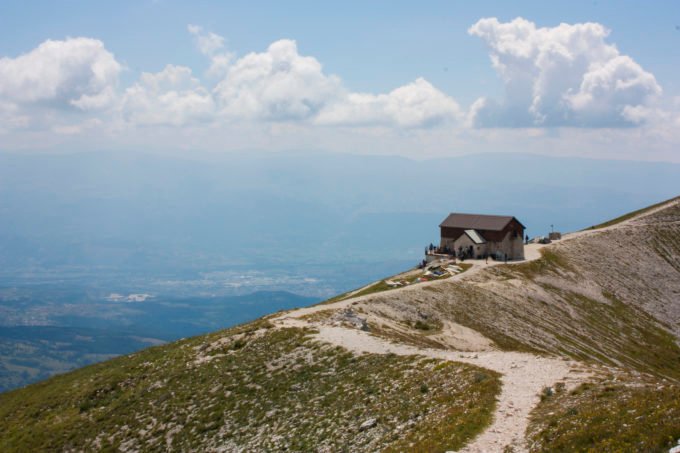
Let’s toast to drinking high on a mountain in the middle of nowhere

Let’s toast to drinking high on a mountain in the middle of nowhere
Gentiana Liquor in Abruzzo
We hiked through vast pastures and barren rocks, and then hiked more through a steep gravel path to reach the ridge at nearly 2,400 meters (7,900 feet), where there was a lodge.
At the the end of a long hike, there must be drinks. We went in.
We asked for grape pie and Amaro, an alcoholic herbal infusion popular across Italy. Our waiter paused. He was a young man with hip-length dreadlocks and a southern Italian accent, serving drinks in the middle of nowhere.
“Do you want Amaro, or do you want something typical from here?” he asked.
“Here” is Campo Imperatore—a high plateau in the Gran Sasso national park, a mountain park in the Abruzzo region of central-southern Italy that reaches nearly 3,000 meters (9,842 feet). The views are breathtaking. The plateau bears no trace of humanity for miles. The only exceptions are a few cars and an abandoned hotel a little way downhill from the lodge.
The hotel looks derelict, but has the dignified air of historical sites that have been left behind. When Italy switched sides during World War II, Benito Mussolini was imprisoned here, which speaks to the remoteness of the place. In 1943, German paratroopers came to rescue him with gliders. The war went on.
Our waiter brought the pie and the drinks, which turned out to be Gentiana liquor. It’s an infusion of sun-dried Gentiana roots in local white wine—Pecorino or Trebbiano—with added sugar and pure alcohol.
The taste has the complexity of white wine, the bitterness of the roots and the sweetness of sugar, and it gives you a burning feeling in your throat, as though it contained more alcohol than its 25 percent ABV. At first I didn’t like it, but during the rest of my journey through Abruzzo I couldn’t drink anything else.
While I had a few, I only picked up a few things about it. It was always homemade. The better the wine, the better the final product. Infusion times vary, and everyone thinks they make the best in the region.
Gentiana roots must be bought in pharmacies. Since Roman times, people have believed that these roots have medical benefits, and they are still used in herbal medicine to treat, well, a lot of stuff. Recently, Gentiana became very popular in Abruzzo, and people started picking the roots in the park and went a bit too far. (A local told me that pickers were destroying the park.) This was an exaggeration, but it also explained why picking Gentiana roots was banned. Hence the pharmacies.
Gentiana treated us too. We relaxed. We lay under the sun, contemplating the paradise below. The world looked different at that altitude, in the middle of nowhere, with a weird new drink in hand. Things looked slower.
The wind muffled sounds around us, but we could hear snippets of somebody else’s conversations. A group talked about the importance of losing and how to lose well in life. Another about the imminent transfer of Gonzalo Higuain to AC Milan.
They went on for a long time, and sounded very out of place. We remained silent until we had to move on.
Up Next
17 Things to Know Before You Go to Milan
22 Things to Know Before You Go to Calabria
Somehow, this land of fiery peppers, next-level pizza, and superlative beaches is one of Italy’s least-visited regions.
18 Things to Know Before You Go to Trieste
Embrace the melancholy, the buffet, and a new coffee language: how to travel well in Italy’s polyglot port state.
A Model Farm in the Yucatán Looks to the Ancient Maya
Mestiza de Indias is an innovative, Maya-inspired regenerative farm in the middle of a region threatened by mass tourism and overdevelopment. Its founder has a lot to say about why food matters.
The Taste of Being Thrown Around by the Sea: Q&A with chef Mari Fernandez
On Spain’s Asturian coast, in the small fishing town of Puerto de Vega, on Plaza Cupido—Cupid Square—a self-taught cook writes culinary love letters to the Cantabrian Sea.






